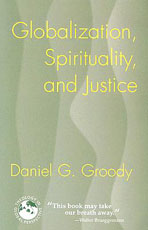"On September 12, 1962, President John F. Kennedy delivered a visionary speech in which he laid down an unprecedented challenge: 'We choose to go to the moon,' he said. 'We choose to go to the moon in this decade and do the other things, not because they are easy but because they are hard.' With these words the space program of the United States shifted into high gear, and its leaders took on the daunting challenge of navigating their way to the moon and making it safely back home. Six years after Kennedy's speech, three astronauts boarded Apollo 8, and a tower of fire boosted them at 24,000 miles per hour into the cosmic night. They were the first to break the gravitational umbilical cord with Mother Earth and enter the lunar orbit.
"On Christmas Eve, 250,000 miles from home, the crew of Apollo 8 reached the dark side of the moon. As they passed above the shadows of the cold and lifeless terrain of the lunar surface, they glimpsed what no human beings had ever seen before: the earth rising over the moon's horizon. Beholding the world in this way inspired the astronauts to read the first words from of the Book of Genesis:
" 'In the beginning, God created the heaven and the earth, and the earth was without form, and void; and darkness was upon the face of the deep. And the Spirit of God moved upon the face of the waters. And God said, Let there be light: and there was light. And God saw the light and that it was good: and God divided the light from the darkness (Gn 1:1-4).'
"Seeing the earth from space was a milestone of political will and scientific achievement, human understanding and global awareness, theological insight and divine contemplation.
"Beholding our planet from space has enabled us to see our place in the universe in a new way. American astronaut Donald Williams noted, 'For those who have seen the earth from space, and for the hundreds and perhaps thousands more who will, the experience most certainly changes your perspective. The things that we share in our world are far more valuable than those which divide us.' As he was orbiting the globe in the Space Shuttle, Saudi Arabian astronaut Sultan Bin Salmon al-Saud observed, 'The first day, we pointed to our countries. Then we were pointing to our continents. By the fifth day we were aware of only one Earth.' German cosmonaut Sigmund Jähn also said, 'Before I flew I was already aware of how small and vulnerable our planet is; but only when I saw it from space, in all its ineffable beauty and fragility, did I realize that humankind's most urgent task is to cherish and preserve it for future generations.' A gift of God, the earth is a precious, delicate, celestial jewel of breathtaking beauty with infinitely rich topographical, biological, and cultural diversity. A human responsibility, it is the place that we are called to care for and cultivate, and it is the context where we learn to live in relationship with each other. It is the cosmic home of over six and one-half billion people.
"If the world as we know it today was proportionally reduced to a village of 100 people, 51 would be male; 49 would be female; 60 would be Asian, 14 African, 11 European, 14 American (North, South, Central, and Caribbean), and 1 Australian or New Zealander. Drawing people together from many different cultures, languages, and religions, 14 in this village would speak, as their first language, Mandarin, 5 English, 5 Spanish, 3 Hindi, 3 Portuguese, 3 Bengali, 2 Russian, 2 Japanese, 1 Arabic, and 1 German. The other 61 would speak Indonesian, French, Italian, Korean, Thai, Vietnamese, and many other languages. From a faith perspective, 33 would be Christian; 20 Muslim; 14 atheist, agnostic, or nonreligious; 13 Hindu; 13 from other religions; 6 Buddhist; and 1 Jewish. Making the earth a hospitable and peaceful home for the diverse members of the human family is one of the enduring challenges of this global village."
